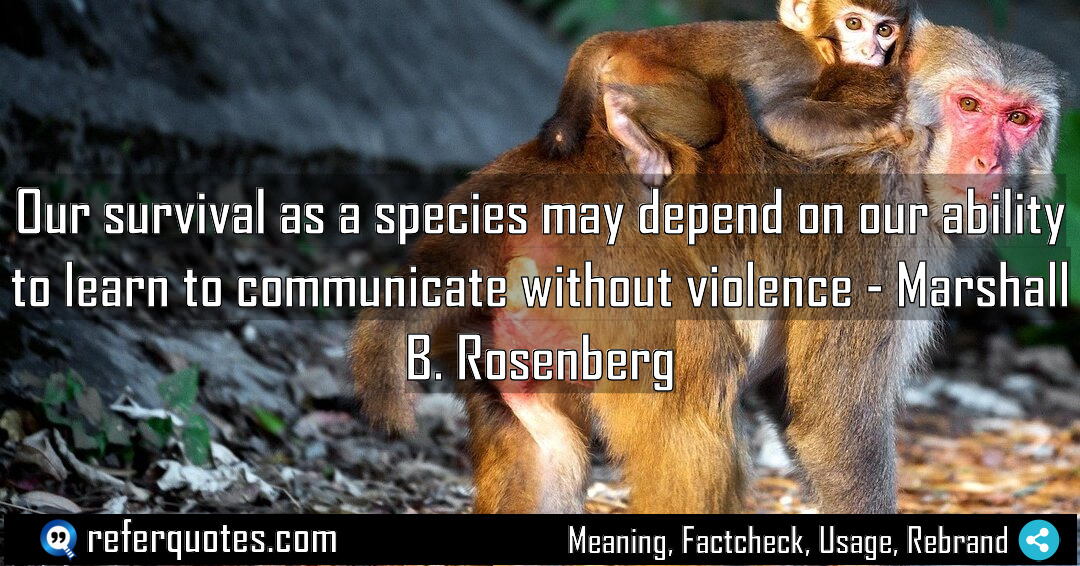
Our survival as a species may depend on our ability… It’s a bold statement, right? But when you really sit with it, you start to see it’s not just about avoiding conflict—it’s about fundamentally rewiring how we connect.
Share Image Quote:
Table of Contents
Meaning
At its core, Rosenberg is saying that our very existence hinges on upgrading our communication from a language of blame and judgment to one of empathy and shared humanity.
Explanation
Look, we’ve all been there. A tense meeting, a family argument. Words become weapons. We defend, we attack. Rosenberg’s genius was framing this not as a soft skill, but as a survival mechanism. He argued that most of our violence—verbal, emotional, physical—stems from a tragic, clumsy expression of unmet needs. When we can’t clearly say “I feel lonely because my need for connection isn’t being met,” we instead lash out with “You never spend time with me!” That blame? It’s violence. And that cycle, on a global scale, is what threatens us. Learning to communicate with compassion is literally about choosing a future where we don’t destroy each other.
Quote Summary
Reading Level85
Aesthetic Score85
Origin & Factcheck
This is straight from Marshall B. Rosenberg’s seminal 1999 book, Nonviolent Communication: A Language of Life, first published in the United States. You sometimes see the sentiment echoed elsewhere, but this specific, powerful phrasing is uniquely his.
Attribution Summary
Where is this quotation located?
| Quotation | Our survival as a species may depend on our ability to learn to communicate without violence |
| Book Details | Publication Year: 1999; ISBN: 9781892005038; Last edition: 3rd Edition (2015); Number of pages: 264. |
| Where is it? | Preface, Page xiii (2015 edition) |
Context
He wasn’t just talking about international diplomacy. He placed this idea right in the middle of everyday life—parenting, teaching, managing teams. He was showing that the micro-aggressions in our daily talk are the same root cause as the macro-violence in the world. It all starts with how we speak to the person right in front of us.
Usage Examples
So how do you actually use this? It’s a powerful reframe for so many situations.
- For Leaders & Managers: Use it to shift team culture. Instead of “Your report was late,” guide them towards “When I don’t get the report on time, I feel anxious because I need reliability to present to the client. Can we talk about what support you need?” It transforms conflict into collaboration.
- In Relationships & Parenting: This is ground zero. It moves conversations from “You’re so messy!” to “I feel overwhelmed when I see dishes in the sink because I need order to relax. Would you be willing to help me clear them?” It de-escalates instantly.
- For Personal Growth: Honestly, the most powerful use is internal. Catching your own self-judgment. Changing “I’m such an idiot for making that mistake” to “I feel disappointed because I need competence. How can I learn from this?” That’s nonviolent communication with yourself.
To whom it appeals?
Share This Quote Image & Motivate
Motivation Score90
Popularity Score95
Shareability Score90
FAQ
Question: Is this just about being nice and avoiding conflict?
Answer: Absolutely not. That’s the biggest misconception. It’s about being radically honest and compassionately direct. It’s not passive. It’s about clearly stating your truth without blame, which is often far more powerful and effective than “being nice.”
Question: Does this mean I can never get angry?
Answer: No, it means understanding your anger. Rosenberg taught that anger is a secondary emotion, a alarm bell that a deep, unmet need is screaming for attention. Instead of lashing out *with* anger, you learn to dig underneath it to find the need—often for respect, consideration, or safety—and communicate *from* that place.
Question: This sounds really difficult. Is it even practical?
Answer: It’s a practice, not a perfection. You’ll fumble. You’ll forget in the heat of the moment. The goal isn’t to get it right every time, but to get it right *more often*. And even a small shift can completely change the trajectory of a conversation. It’s a muscle you build.
Similar Quotes
You know, “The purpose of Nonviolent Communication is to remind us” of something we’ve always known deep down. It’s not about learning a new trick, but about peeling back the…
You know, the objective of Nonviolent Communication isn’t about changing people. It’s a total mindset shift from trying to win to building a genuine connection. It flips the script on…
Our ability to offer empathy can allow us to stay vulnerable… it sounds simple, but this is the secret sauce to defusing conflict and creating real connection. It’s about disarming…
Without communication, even love can die is a truth I’ve seen play out time and again. It’s not about grand gestures, but the daily, quiet erosion of connection. When the…
When we stay with empathy, we allow others to fully express themselves. It’s a game-changer because it removes the fear of judgment. This simple shift transforms how we connect with…
